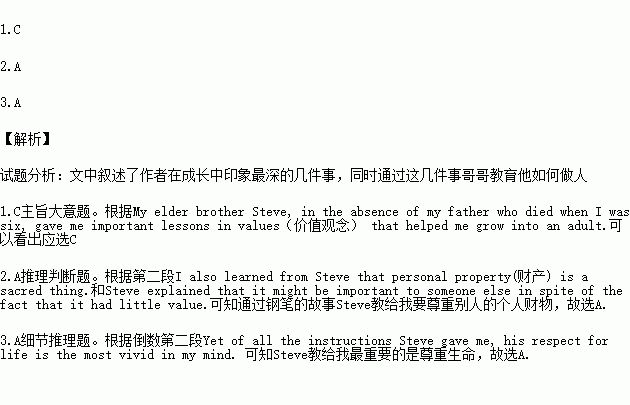题目内容
My elder brother Steve, in the absence of my father who died when I was six, gave me important lessons in values that helped me grow into an adult.
For instance, Steve taught me to face the results of my behavior. Once when I returned in tears from a Saturday baseball game, it was Steve who took the time to ask me what happened. When I explained that my baseball had soared through Mrs. Holt’s basement window, breaking the glass with a crash, Steve encouraged me to apologize to her. After all, I should have been playing in the park down Fifth Street and not in the path between buildings. Although my knees knocked as I explained to Mrs. Holt, I offered to pay for the window from my pocket money if she would return my ball. I also learned from Steve that personal property(财产) is a sacred thing. After I found a shiny silver pen in my fifth-grade classroom, I wanted to keep it, but Steve explained that it might be important to someone else in spite of the fact that it had little value. He reminded me of how much I’d hate to lose to someone else the small dog my father carved from a piece of cheap wood. I returned the pen to my teacher, Mrs. Davids, and still remembered the smell of her perfume as she patted me on the shoulder. Yet of all the instructions Steve gave me, his respect for life is the most vivid in my mind.
When I was twelve, I killed an old brown sparrow in the yard with a BB gun. Excited with my skill, I screamed to Steve to come from the house to take a look. I shall never forget the way he stood for a long moment and stared at the bird on the ground. Then in a dead, quiet voice, he asked, “Did it hurt you first, Mark?” I didn’t know what to answer. He continued with his eyes firm, “The only time you should even think of hurting a living thing is when it hurts you first. And then you think a long, long time.” I really felt terrible then, but that moment stands out as the most important lesson my brother taught me.
1.What is the main subject of the passage?
A. The relationship between mark and Steve.
B. The important lesson Mark learned in school
C. Steve’s important role in mark’s growing process.
D. Mark and Steve’s respect for living things.
2. In the story about the pen, which of the following lessons did Steve teach his brother?
A. Respect for personal property.
B. Respect for life.
C. Sympathy for people with problems.
D. The value of honesty.
3. According to the writer, which was the most important lesson Steve taught his young brother?
A. Respect for living things.
B. Responsibility for one’s actions.
C. The value of the honesty.
D. Care for the property of others.

